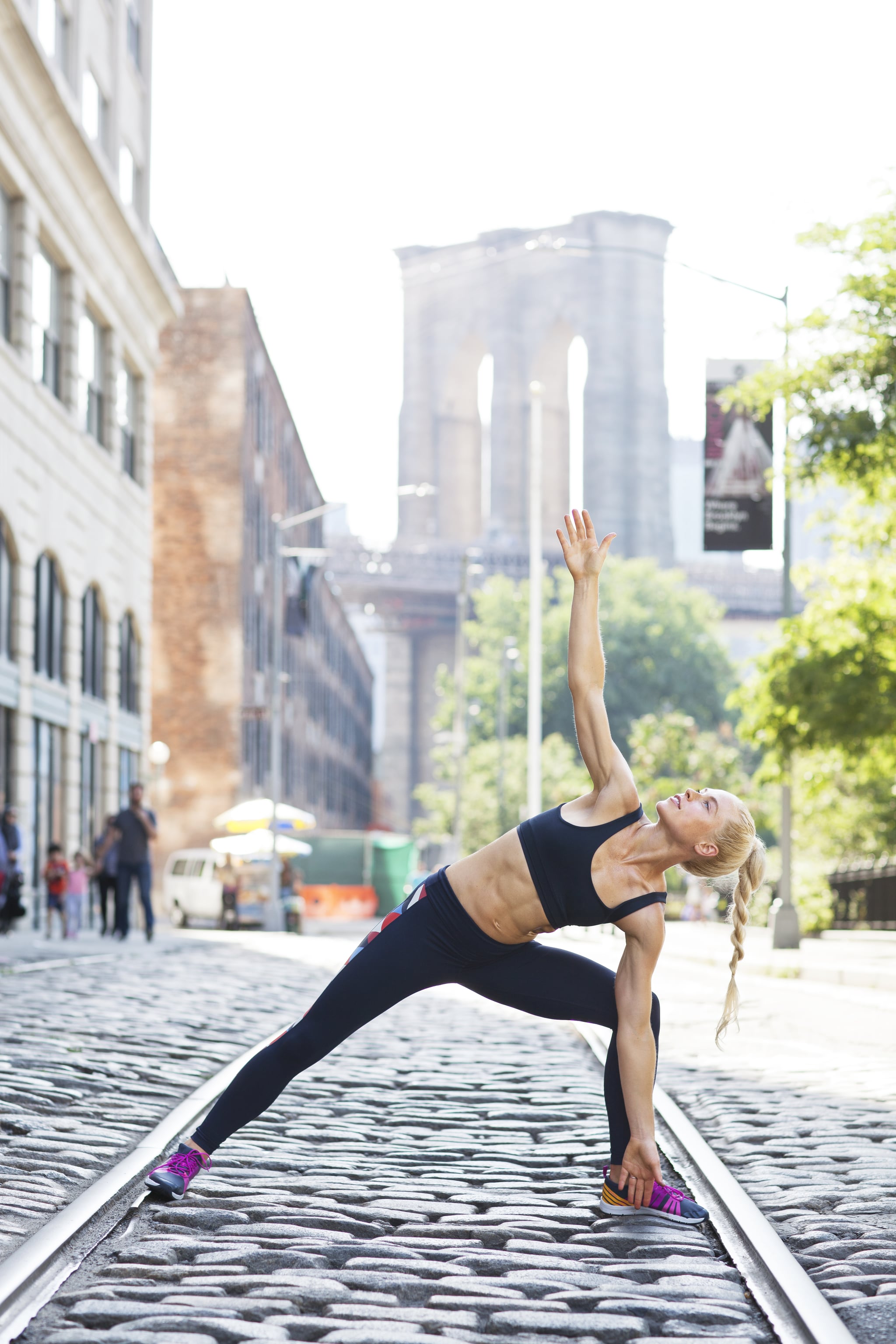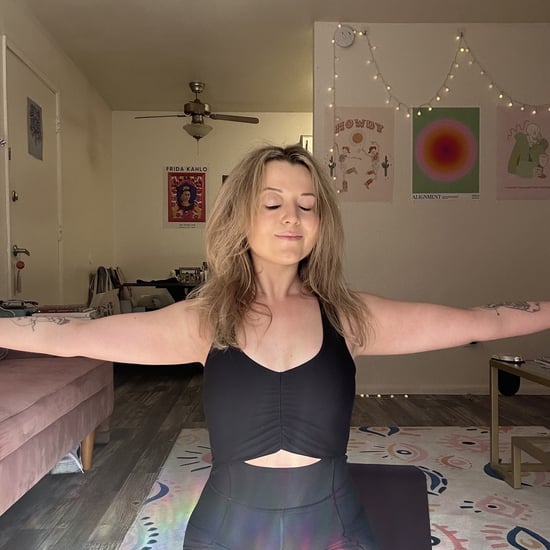Do I Need to Do Yoga?
4 Ways Yoga Will Drastically Change Your Life, Starting Today

You see so many fitness programs and trainer tips that emphasise the importance of yoga once a week for restorative recovery, but what if (you think) you're not good at yoga? Or you're just not that into it? Do you need to do yoga?
Short answer, yes. And if you don't agree — keep reading. Even if it's not your favourite activity, the benefits are substantial. Certified yoga instructor and licensed molecular scientist Stacey Trottier said, "If you want to operate at peak performance levels in all areas of your life consistently, reduce (even eliminate) stress, connect meaningfully with others and yourself, and develop the emotional resilience necessary to achieve your wildest dreams, yes, you need a yoga practice."
"Yoga tends to get misconstrued as just stretching exercises for the bendy and perky, which is not the case," said Trottier. "The main facet (and the original intention) of yoga is to still the mind to dissolve ego and connect your body with your mind and spirit, whatever that may be for you."
Even traditional trainers agree. Several trainers we have interviewed or trained with recommend doing the restorative practice at least once week.
There are four huge reasons to incorporate even just 30 minutes of yoga into your weekly routine; your lungs will benefit, you'll have a clearer head for work and everyday life, your mood will see a nice lift, and your other types of training will improve. Here's an in-depth look at exactly how yoga will benefit your life, even if you don't think it will.
Do It For Your Breath
"First and foremost, yoga is a breathing practice," said Janine Narvaez, RYT 200 and CorePower Yoga assistant studio manager. "Many people do not realise that when they think of yoga off the top of their head."
She herself was a skeptic. "Before I started practicing, I thought yoga had nothing to offer me. It was was too slow, too much stretching, and not active enough for me." She said it wasn't until she realised that it's more than just a physical practice that things clicked. "I was thinking solely of the physical practice, or the asanas, but the biggest takeaway from yoga is actually the breathing," she said. And that ability to breathe better can fuel your other workouts, as well as give you more energy. "When you realise that your breath is your fuelling force that gives you energy, then you can put more attention to it. The breath is something you can control, and yoga teaches you that."
"The breath also aids in both the mental practice and the physical practice," she said. "You can even find some athletes who completely changed their sport around because they started breathing differently," Narvaez said, while talking about how the Golden State Warriors coach implemented mandatory yoga practice to help the team with their breathing. If NBA players need it, you probably need it, too.
Do It For Your Brain
Have you ever wondered how some people stay so relaxed and stress-free? It might be because of yoga. If you're feeling bogged down by work, home life, or general stress, consider how yoga can promote a sense of calm, with science to back it.
"The asanas (or physical exercises) were developed many, many years later to assist in enhancing this deep concentration by giving us postures to focus on," Trottier said, but it also helps with recovery, both body and mind. She told POPSUGAR that the asanas were created for "clearing blockages to allow energy to flow through and promote healing both physically and emotionally."
"It's like driving down the street and hitting all the green lights."
Do you ever wish you could just turn your brain off from emails, push notifications, and work? Here's your chance. "We are constantly bombarded with distractions in this technological age," Trottier said. This is a concept she described as "transient hypofrontality — coined by Steven Kotler — which means a temporary shutdown of the prefrontal cortex in the brain, the area responsible for executive function, decision-making, rational thought. It can be achieved through yoga and meditation that allows us to reach a state of flow," i.e., turning off the work and stress. "It's in this flow state where your cognitive abilities are optimised, your focus is honed in, and you are your most creative even in the midst of distraction. It's like driving down the street and hitting all the green lights."
Do It For Your Mood
You'll also get an excellent mood boost, which is great if you're fighting anxiety, depression, or just feeling meh. "When you're in this state, which is often achieved after a great yoga class, you feel empowered and engaged in your life. . . . It's that Zen bliss," said Trottier. "Yoga is not only responsible for easing tension in your body (which is great, too) and promoting a healthy lifestyle, but scientifically this moving meditation and the breath work involved has been shown to alter you at the molecular level to create long-lasting effects of stability so you can show up more powerfully in your life if practiced regularly."
Back to yoga breathing — this can help you with anxiety as well! "You do not only practice yoga when you're on the mat moving with your breath, but also when you're off the mat," said Narvaez. "You can make your breath long and smooth, and you can use your breath to ease you out of uncomfortable situations or anxiety-filled moments."
Do It For Your Body
A yoga practice is imperative for "increasing mobility, correcting postural deficits, and increasing the integrity and range of motion of tight muscles," said Liz Letchford, MS, ATC, PhD candidate, and personal trainer at DIAKADI. "Simply stretching might not be enough, especially if you have been stretching a muscle group for many months without seeing any progress."
Are you stretching a muscle group constantly, and it's still really stiff? "The body has a system in place to protect weak muscles and joints, and that relentlessly tight muscle might be a sign that something is out of balance," she said. This is where yoga comes in.
Letchford also described physical benefits that come from mental ones. She told us that while yoga helps you to "develop a calm mind," your central nervous system reaps the benefits. "For those who are involved in an especially intense training routine, it is important to cultivate balance in your weekly regimen to allow your central nervous system to recover."
"Simply stretching might not be enough, especially if you have been stretching a muscle group for many months without seeing any progress."
She works with a range of different clients, from triathletes to Olympians to your average fitness enthusiast, and she recommends yoga to all of them as a supplement to their training, because it deepens the mind-body connection (which is — surprise — important for all areas of training and physical activity). "It allows an opportunity to check in with the body and really notice what is tight, painful, and out of balance. This facilitates a deeper connection to the body and allows for more connected, intuitive movement during more intense training."
Trottier also told us about a study, which she said is one of many, that "was conducted based on blood drawn from participants before and after a weeklong yoga retreat." The results? They got a boosted immune system. "The 'relaxation response' produced by yoga prompted changes in gene expression that strengthened the immune system."
If You Really Hate It . . .
If all that still didn't convince you (seriously?), there are still options for you. You shouldn't force yourself to do anything you hate. Try meditation for the mental and emotional benefits, and mobility exercises for your body. Letchford gave some insight to this, saying, "I respect yoga for the holistic benefits, however there are other ways to incorporate mobility and balance either in addition to or in place of yoga. I personally recommend physical therapist and mobility expert Kelly Starrett's no-nonsense approach to gaining range of motion and proper movement and incorporate many of his mobility exercises into my clients' and my own practice."






